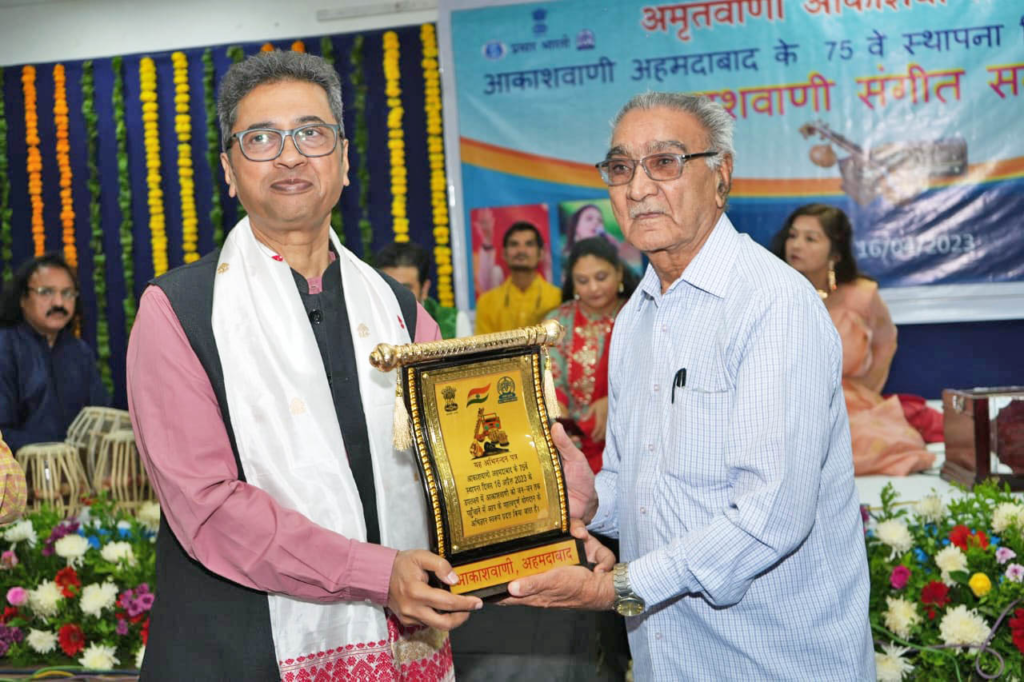This is the second essay in the series of essays on Sindhi language and literature in India. With my essays, I seek to touch upon the sociology of Sindhi literature while writing about socio-political contexts of writing and reception in Indian society and within the context of migration and partition.
The first essay can be accessed here.

Ahmedabad-based Dr Jetho Lalwani won the Sahitya Akademi Award for Sindhi in 2020 for Jihad, a collection of plays. He was a librarian at a school in the same city and has had a deeper relationship with books thanks to that day job. As a researcher, he has worked extensively on Sindhi folklore, which he draws upon to publish commentaries, anthologies, folk criticism, and his creative work.
Knowledge about Sindhi contribution is so little and so rare to come across that despite its anchoring in the modern Indian past, it has acquired a folklorish aura. History textbooks mention the lone Acharya Gul Kriplani but beyond him, there is nothing. It is against this context of silence that Lalwani’s one-act play Amman, Maan Moti Indoos (Mother, I Shall Return) needs to be seen. The play is based on the life of Hemu Kalani. He was a 19-year-old revolutionary who became a martyr when attempting to derail a train carrying ammunition to Quetta for the British officers to suppress the Quit India Movement in Sindh in 1943. He refused to plead for mercy and to reveal the identities of others who worked with him.
The play begins with Hemu’s mother and grandmother wondering about his safety, while also thinking about getting him married. Hemu arrives but leaves immediately for a mission. But before he departs, in the conversation with the two women, he speaks of his love for the country. To their suggestion that he get married to the girl his father has promised his hand to, he responds:
Hemu: I too have promised Sindhu Mother and Mother India: I will liberate her from tyranny. I will not be at peace until then. Until the British leave and my country is free, I will fight relentlessly.
Gangabai: These tyrants, these sinners, the British … one day they will all die a pathetic death. Freedom shall be ours.
Hemu: Your words will come true, Vaddi Amma. Until then, we will continue to scream our lungs out with ‘Quit India.’
Jethibai: But why is that stopping you from getting married?
Hemu: I am in love with the idea of freedom. There’s no going back on the road to freedom, to strive for freedom. Why will I knowingly make a widow out an innocent young woman and ruin her life? I am on a path that is not easy: I might die as I fight for freedom.
The grandmother and the mother reluctantly let him as they bless him for success. As we know today, he does not return. When his parents come to see him in prison to persuade him to plead for mercy. When they fail, they bless him so that he faces his execution with pride:
Jethibai: (proudly) Son, out of my motherly love, I forgot that you are not just my son. You belong to the country, to Sindh. You are a brave soldier. My son, I now willingly, happily bless you in your sacrifice for the sake of the country. May you accept the noose like a garland. May Guru Nanak and Jhulelal bless you with courage as you walk towards death.
Hemu: Yes, Amman. I will return. Inquilab, zindabad. Long live, India, Long live, Sindh.
The trajectory that shaped Sindhi literature in India did not let drama evolve the way other genres did. For the tradition of drama to survive, a strong community of patrons and theatre-goers is needed. Given the scatteredness of Sindhis in different countries, there was not much Sindhi theatre activity. Lalwani’s plays, in general, read like street theatre. For instance, they are short: though they are subdivided into scenes, they are one-act plays. There is no elaborate description of the stage and stage directions. The characters and the dialogues do not work towards subtle emoting. But that is because they work with the larger limitation of being cut off from a region and continuity in tradition that would help the Sindhi community stay in touch with themes, tropes, legends, and stories about their past. Instead, Lalwani’s plays, including Mother, I Shall Return, do what can be done best with limited resources for financial, cultural and aesthetic resources that go into the making of theatre as a practice: they work with the idea of awareness and information. Their purpose is to remind the Sindhi theatre-going community, in plain language, about forgotten stories that remain confined to Sindh or the past whose lack adversely affects the self-image Sindhis fashion for themselves: it is as if Sindhis had no role to play in the Indian freedom movement or as if they have remained innocent of the partition of the subcontinent. Geographical displacement necessitates simpler engagements with memory: whatever can be remembered ought to be squeezed into the limited time and resources one can find.
It is not the individual Hemu Kalani that makes Lalwani’s play interesting. It is the metonym Hemu Kalani that matters more: there must be many such stories about Sindh and Sindhis waiting to be told and that deserve to be brought into the narratives of Indian independence and resistance. Through Hemu Kalani, many more stories ought to ‘return’ to Sindhi memory in India.
***
Soni Wadhwa teaches Literature Studies at SRM University, Andhra Pradesh. Her digital archive PG Sindhi Library is dedicated to post-Partition Sindhi writing published in India. Her digital humanities project on Sindhi libraries in India is funded by IIT Indore. She has also received a grant from George Mason University for her research on the making of Sindhi literature as an Indian literature.

Keep it up. Godspeed.